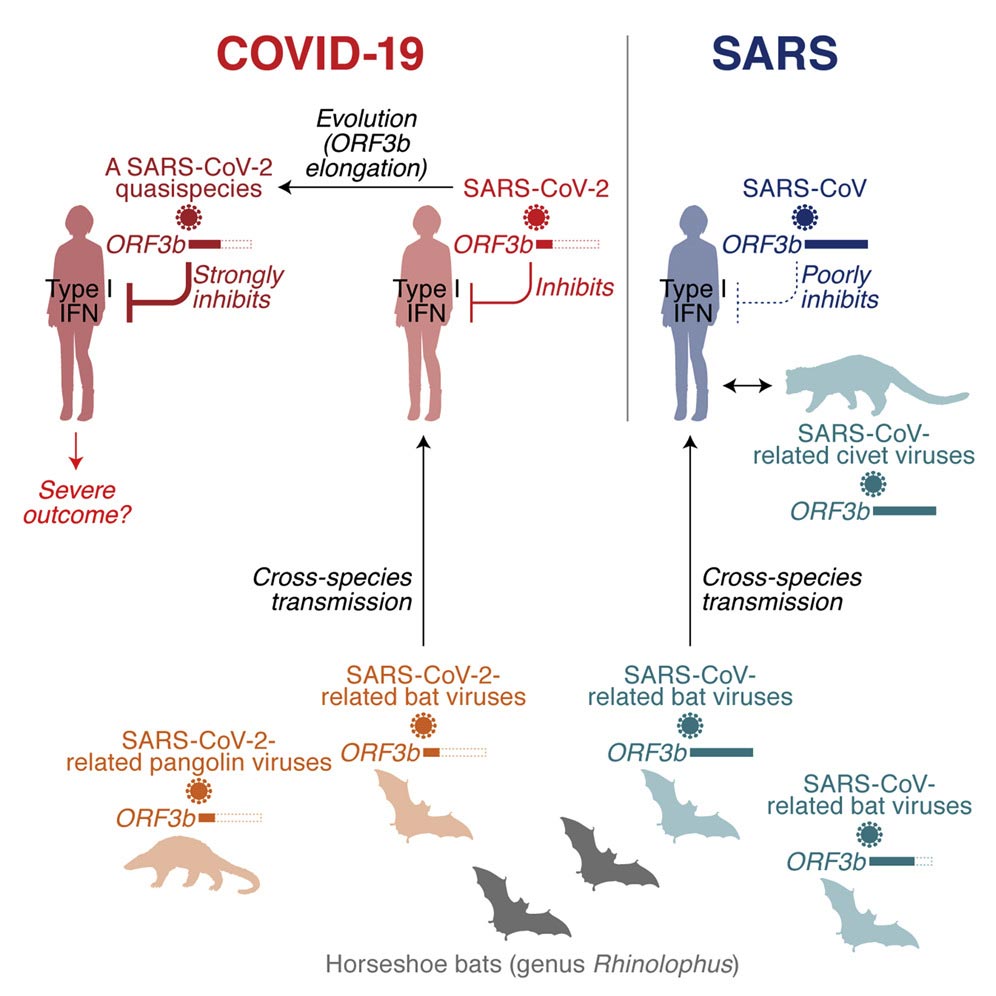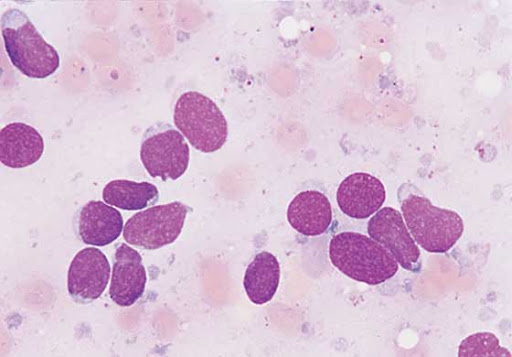One of the features that distinguish SARS-CoV-2 from its more pathogenic counterpart, SARS-CoV, is the presence of premature stop codons in its ORF3b gene. Here we show that SARS-CoV-2 ORF3b is a potent interferon antagonist that suppresses the induction of type I interferon more efficiently than its SARS-CoV ortholog. Phylogenetic analyzes and functional tests show that SARS-CoV-2-related viruses from bats and pangolins also code for shortened ORF3b gene products with strong anti-interferon activity. In addition, analyzes of approximately 17,000 SARS-CoV-2 sequences identify a natural variant in which a longer ORF3b reading frame has been reconstituted. This variant was isolated from two patients with severe disease and further increased the ability of ORF3b to suppress interferon induction. Therefore, our results not only help explain the poor interferon response in COVID-19 patients, but also describe the occurrence of natural SARS-CoV-2 quasi-species with an extended ORF3b gene that may potentially influence COVID-19 pathogenesis. Photo credit: © Kei Sato
The ongoing pandemic will be over from October 2020 SARS-CoV-2 has resulted in more than 35 million reported cases and more than 1 million deaths worldwide. An outstanding feature that makes a difference COVID-19 of SARS in terms of immune responses is the poor induction of a type I interferon (IFN) response by SARS-CoV-2 compared to SARS-CoV and influenza A virus. In particular, disturbed IFN responses are linked to COVID-19 disease. However, the molecular mechanisms underlying the inefficient IFN responses in SARS-CoV-2 infection remain unclear.
A research team at the Institute of Medical Science at the University of Tokyo (IMSUT) wanted to characterize the viral factors that determine immune activation in SARS-CoV-2 infection and found that ORF3b, a gene encoded by SARS-CoV-2, is a potent IFN antagonist.
“The poor IFN responses in COVID-19 patients can be explained by the action of this viral product ORF3b,” said senior scientist Kei Sato, associate professor (principal investigator) in the division of systems virology, division of infectious disease control. IMSUT.
The results of this research were recently published in the journal Cell reports.
ORF3b as a viral IFN antagonist
Although SARS-CoV infection causes acute and severe pneumonia, SARS-CoV-2 infection can be asymptomatic or lead to flu-like symptoms such as fever, cough, and fatigue. Compared to SARS-CoV and influenza A virus infections, COVID-19 is a hallmark of SARS-CoV-2 infection, the poor induction of a type I interferon (IFN). In particular, impaired IFN responses have been linked to the severity of COVID-19. However, the molecular mechanisms underlying the inefficient IFN responses in SARS-CoV-2 infection remain unclear.
By comparing the sequences of SARS-CoV-2-coding genes with those of SARS-CoV, the research group found that the gene length of SARS-CoV-2 ORF3b is significantly shorter than that of SARS-CoV ORF3b.
Since SARS-CoV’s ORF3b is known to be a viral antagonist against IFN production, they hypothesized that the difference in the length of the ORF3b gene between SARS-CoV-2 and SARS-CoV altered their anti-IFN activity and could further explain the difference in the symptoms of these two viral infections.
Surprisingly, SARS-CoV-2 ORF3b is a stronger IFN antagonist than SARS-CoV ORF3b. Phylogenetic analyzes and functional assays showed that SARS-CoV-2-related viruses from bats and pangolins also encode shorter ORF3b gene products with strong anti-IFN activity.
Characterization of a natural SARS-CoV-2 ORF3b variant with increased anti-IFN activity
In addition, analyzes of approximately 17,000 SARS-CoV-2 sequences identified a natural variant in which a longer ORF3b reading frame was reconstituted. This variant suppresses IFN even more efficiently than ORF3b of the parental SARS-CoV-2 strain.
Consistent with an association of IFN suppression with disease severity, the two patients in Ecuador harboring SARS-CoV-2 with the extended ORF3b variant were critically ill; One was treated in an intensive care unit and the other died of COVID-19.
It is important, however, that there is no direct evidence that the viruses detected in these two COVID-19 patients in Ecuador are more pathogenic than the reference strain. Although they cannot say whether this variant is associated with any other disease course, it is plausible that naturally occurring length variants of ORF3b can possibly contribute to the development of pathogenic SARS-CoV-2 variants.
Therefore, it will be important to continue monitoring the virus sequences to see if new ORF3b variants appear during the current pandemic.
Associate Professor Kei Sato said, “To the best of our knowledge, this study is the first to uncover the role of a SARS-CoV-2 encoded protein that may be associated with the progression of COVID-19.”
Reference: “SARS-CoV-2 ORF3b is a potent interferon antagonist, the activity of which is increased by a naturally occurring stretch variant” by Yoriyuki Konno, Izumi Kimura, Keiya Uriu, Masaya Fukushi, Takashi Irie, Yoshio Koyanagi, Daniel Sauter and Robert J. Gifford , USFQ-COVID19 Consortium, So Nakagawa and Kei Sato, September 4, 2020, Cell reports.
DOI: 10.1016 / j.celrep.2020.108185



